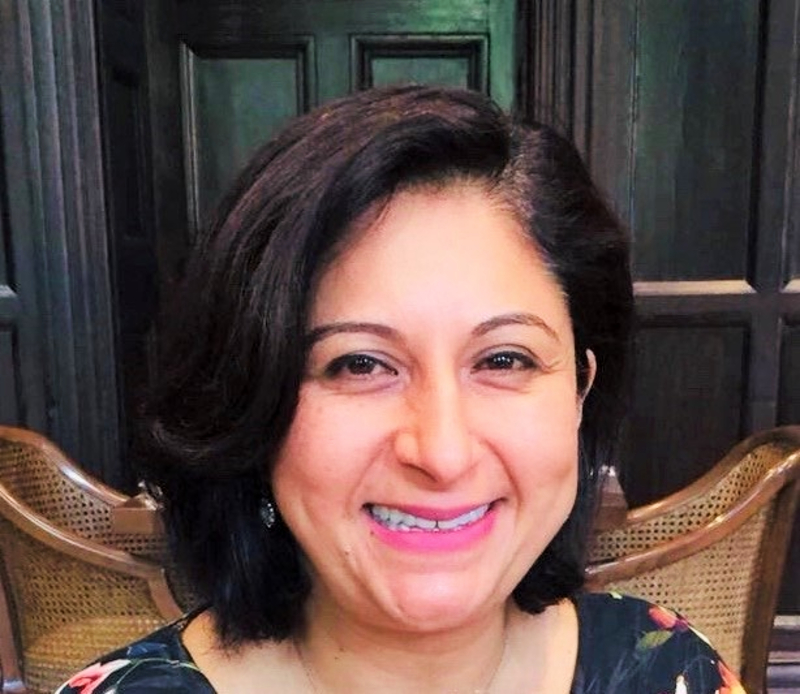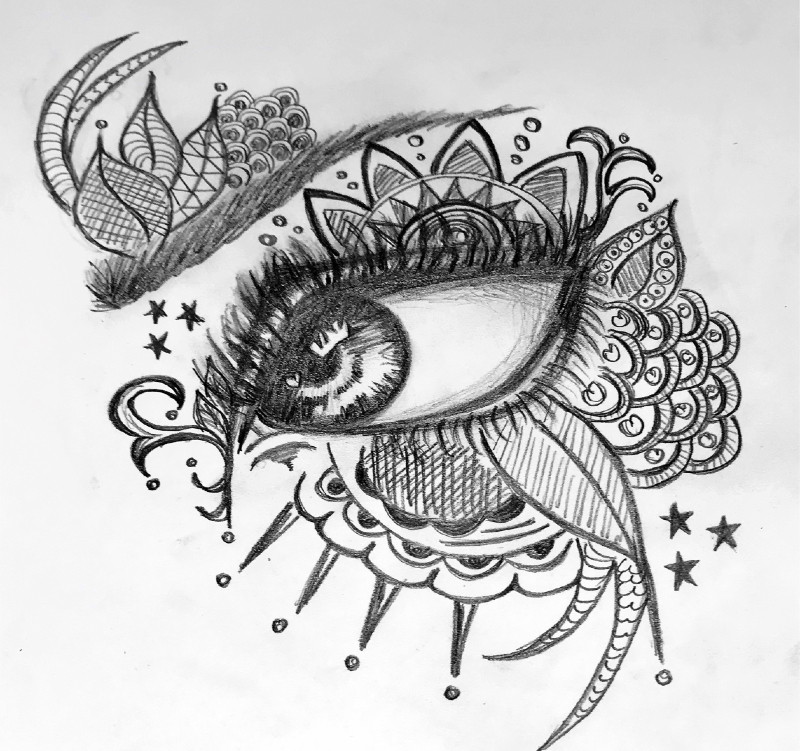Amisha is a mother of two beautiful children, having had a very successful career working in the IT sector for major City firms, and is an artist at heart. She has survived two meningiomas (brain tumours) and is currently living with her third one.

The first brain tumour was diagnosed by chance, in 2005, the second in 2010. Both were surgically removed by craniotomy (brain surgery). However, a further third tumour was diagnosed in 2015.
This time it was deemed too dangerous to have any more invasive surgeries to the head. Instead, Amisha received Gamma Knife radiation to shrink it and is currently living with this tumour, which is stable.
In this interview, Amisha generously shares her story, in order to raise awareness and support others who have been through or are currently affected by a brain tumour diagnosis – whether personally, or by caring for a loved one.
What were your symptoms and how were you first diagnosed?
I used to suffer from occasional headaches for about 10 years prior to my diagnosis.
The vision in my right eye gradually had become blurry over a space of about two or three years before diagnosis, but I put it down to spending long periods of time in front of a computer.
I never mentioned the blurry vision to my GP, but went to see an optician and was just advised to wear glasses for screen use.
I had just moved offices for work and had to visit a new optician to my regular one for a check-up. The optician noticed some greyness behind my retina in my right eye. She wasn’t sure what it was so she referred me to a specialist at Moorfields Eye Hospital.
After my check-up there, I was sent to see a consultant ophthalmologist at The London Clinic. As soon as he checked my eyes, he told me to go downstairs for a brain MRI scan. I thought there surely must be a mistake. It was my eyes, not my brain!
I received a call the next day asking to come back to The London Clinic to see Mr Peter Bullock, who was to be my future neurosurgeon and lifesaver. I had my Dad with me and Mr. Bullock sat us down and gave us the news that was to change my life forever!
He said you have a brain tumour and it has been growing for the past five to ten years. It is sitting on your optic nerve which is why it is affecting your vision, but it has squashed the nerve like a ribbon and we have to operate fast to save your eye.
What treatments have you experienced and how did you feel before and afterwards?
I underwent an almost nine-hour craniotomy to remove the first tumour in 2005 and spent 15 days in hospital. I then had another craniotomy which lasted about five hours to remove the second tumour in 2010, and I spent five days in hospital.
Finally, I had Gamma Knife radiation in 2016 to try to shrink the third tumour.
Before my surgeries, Mr. Bullock explained everything patiently to me and my family and always reassured us if we had any concerns. He was the calm before the storm.
I was very anxious as not only are you trying to deal with the whole range of emotions that you are feeling, but at the same time you are constantly worried about your family.
The morning of the first surgery, the nurse who looked after me was amazing and funny, she really put me at ease. She told my husband that he looked like Andy Garcia, so he was delighted!
When I woke up after the surgery I was in the Intensive Care Unit. All of my senses were heightened – the heat, noise, light, all of it was too much – I remember my Mum was turning the pages of a magazine and it sounded like she was tearing the pages out.
Instead of five days, I was kept in for 15 as I really was not well and had to be monitored constantly.
When I went home after that first surgery I began to realise the gravity of the situation – that is when the emotional trauma began, which was really hard to handle. I was not allowed to drive for a year and was stuck at home. Recovery took a long time, not just physically but emotionally and mentally.
Has the condition inhibited you from getting on with life/activities in any way?
I had only been married two years when I was first diagnosed. It turned our lives upside down. After my surgery and recovery, I attempted to return to work, but could not concentrate for long and was just tired all the time.
Unfortunately, due to my low energy levels, headaches, lack of motivation, partial loss of vision, and extreme fatigue, I had to give up my job as a Project Manager at Citigroup in Canary Wharf where I had been working for the eight years before my diagnosis. I have not been back to full-time employment since.
The fatigue after the first two brain surgeries also left me with a lack of family/social life and I was not allowed to drive for a year after each operation in case of seizures.
This left me feeling sad, helpless and lost as I had nobody to speak to who really understood what I was going through. It felt like I had nowhere to go. I was just too exhausted all the time and lost confidence in myself, to go out anywhere or to meet people.
I didn’t feel I could speak to my family and friends about it as I did not want to burden them, so I went from a happy-go-lucky person who was looking forward to married life, to a tired and depressed person with erratic mood swings who was partially blind and on medication for life.
How did the condition impact on you and your quality of life?
Dealing with all of this was challenging enough, but just over a year after my first tumour was removed, I gave birth to twins!
This was a true blessing, but also extremely hard work as I was constantly overwhelmed and exhausted – an unwelcome side effect of the first tumour and the surgery.
When the twins were just three years old, I was hit with the bombshell that there was another tumour growing – this time at the back of my head behind my right ear.
Another brain surgery followed with the same feelings of despair, fatigue and helplessness.
This took a huge toll on my family. Just like me, they struggled to come to terms with my illness and had to take it in turns to look after the twins whilst I was in hospital and in recovery at home.
The kids became emotional and upset as they did not understand why I was away from them having previously been at home 24 hours a day, seven days a week.
In your experience, what has been the most challenging or unusual aspects of dealing with this condition?
The most challenging aspect of having a brain tumour for me is brain fatigue.
This is not the same as regular fatigue, which can be alleviated with rest. This type of fatigue is specific to brain injury patients and can last for years. It can be debilitating as you are constantly tired, even after completing the simplest of tasks.
This can be difficult to explain to anyone who has not experienced it as they think you just need to get some rest in order to feel better.
This condition is known as an ‘invisible illness’. Physically we all look fine on the outside, but nobody can see the emotional and mental trauma on the inside, such as the mood swings, depression, memory loss, extreme tiredness and changes in personality.
This is why support groups are so essential for brain tumour patients and their families. It is difficult for carers too as they are the ones who have to look after you and try and be strong at the same time.
Once you have been sent home from having treatment, you have to find your own way, which can be overwhelming and lonely. Having others who can relate, who understand, and who will not judge you, is a life saver.
What has helped you personally to get through your treatment?
My husband and family have been amazing. They have been with me since the beginning of my diagnosis and continue to support, love and care for me as always.
A special mention has to go out to my surgeon, Mr. Bullock. He is not just a brilliant surgeon, but a wonderfully kind, supportive and caring person. He has always been respectful, calm and reassuring to me and my entire family.
In fact, he is like one of the family. My father, Dr. Amrat Gokani, who is no longer with us, but who was a GP himself, and attended nearly all of my appointments with me said that Mr. Bullock was a rare gentleman and one of a kind!
For the past 15 years everyone I have met at The London Clinic – from the cleaning staff, the receptionists, to the nurses, anaesthetists, endocrinologists, radiologists and other medical staff – has been nothing but professional and polite.
This is what differentiates The London Clinic from other places. All the staff are so welcoming and attentive to the patients. It feels like a home away from home. All the facilities are well maintained, clean and state of the art.
I would have struggled throughout this journey had it not been for a support group that I found as part of a local charity called the Hillingdon Brain Tumour & Injury Group.
Its founder, Becky Haggar, and her team are angels. It is a place full of hope where you can be yourself. You do not have to pretend to be strong all the time as you meet other people who have been through similar experiences, and with whom you can relate. This is so important as it allows you to open up and be vulnerable.
Recently, art has also been my saviour as it is a form of therapy and mindfulness. It is my happy place. I have started painting recently for myself and others, and have taught art to children and adults alike to help them to express themselves creatively.

(Artwork courtesy of https://instagram.com/peace.ofmyart)
How do you feel now? What has treatment enable you to do now you could not do before?
If I had not had the treatment then my symptoms would have been much worse, I would have completely lost my eyesight, or I might not even be here today.
It has given me a second chance at life.
It has allowed me to be a wife, a daughter, a sister, and a mother to my children; and to show them that you can overcome adversity and trauma by being positive and having hope and faith that everything will turn out for the best.
Further information
Hillingdon Brain Tumour & Injury Group





